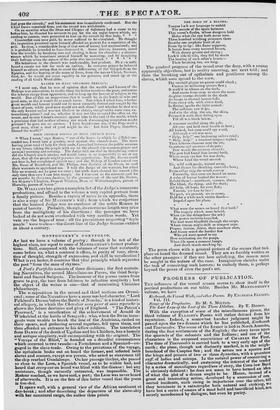MONTGOMERY'S PORTFOLIO.
AT last we have a volume of poetry; though it be not of the highest class, nor equal to some of MONTGOMERY'S former produc- tions. Still, compared with the volumes of verse that constantly .come before us, what a contrast it offers, in purity of tone, eleva- tion of thought, strength of expression, and skill in versification ! What is yet better, it contains that vital principle which separates the poet "from the man of rhymes."
A Poet's Portfolio consists of three divisions; the first contain- ing Narratives, the second Miscellaneous Pieces, the third Scrip- tural and Sacred Subjects. The humour of the poems varies from grave to gay, the tone from loftiness to infantine simplicity ; but the object of the writer is one—that of inculcating Christian philanthropy. The compositions in the second and third sections are Occasi- onal; some of the Narratives have a more marked character. "Lord Falkland's Dream ltefore the Battle of Naseby," is a kind of histori- cal allegory, in which the Chevalier sans pent et sans reproehe is shown the future destinies and glory of England. "The Patriot's Password," is a versification of the achievement of Arnold de Winkelried at the battle of Sempach; who, when the Swiss insur- gents were unable to break the line of the Austrians, rushed on their spears, and gathering several together, fell upon them, and thus dfforded an entrance to his fellow-soldiers. The translation from DANTE of the death of Ugolino and his Children, has a homely and antique simplicity,well corresponding with the original. The "Voyage of the Blind," is founded on a dreadful circumstance which occurred to two vessels—a Frenchman and a Spaniard—en- gaged in the slave-trade. Owing to the privations of the voyage, the optbahnia broke out on board the former, and infected both slaves and seamen, except one person, who acted as steersman till the ship reached Guadeloupe. On her passage thither, she passed so close to the Leon, a Spanish vessel, as to be within hail, and heard that everyone on board was blind with the disease: but any assistance, though earnestly entreated, was impossible. The Rodeur reached, as we have said, a port; the Leon was never heard of afterwards. It is on the fate of this latter vessel that the poem is foneded.
It opens well, with a general view of the African continent at day-break ; and after describing the departure of' the slave-ship with her unnatural cargo, the author thus paints
THE HOLD OF A SLAVER.
Tongue lath not language to unfold The secrets of the space between That vessel's flanks, whose dungeon hold Hides what the sun bath never seen. Three hundred writhing prisoners there Breathe one mephitic blast of air From lip to lip : like flame supprest, It bursts from every tortured breast,
With dreary groans and strong ; Lock'd side to side, they feel by starts The beating of each other's hearts—
Their breaking too, ere long.
The gradual progress of the vessel over the deep, with a course apparently objectless, but ia reality unerring, are next told; and then the breaking out of optbalmia and pestilence among the slaves, which soon spread to the crew.
The twofold plague no power could check ; Unseen its withering arrows flew ; It walk'd in silence on the deck,
And smote from stem to stern the crew.
As glow-worms dwindle in the shade As lamps in charnel-houses fide,
From every orb, with vision fired,
In flitting sparks the light retired : The sufferers saw it go, And o'er the ship, the sea, the skies, Porened it with their failing eyes, Till all was black below.
A murmur swelled along the gale, All rose and held their breath to hear; All looked, but none could spy a sail, Although a sail was near.
44 Help, help !" our beckoning sailors cried ;
" Helm help !" a hundred tongues replied. Then hideous clamour rent the air, Questions and answers of despair : Few words the mystery cleared The pest had found that second bark, Where every eye but his was dark, Whose hand the vessel steered.
Ile, will with panic, turned away, And thence his shrieking comrades bore; From either ship the winds convey Farewells, that soon are heard no more.
A calm of horror hushed the wares: Behold theml—merchant, seamen, slaves, The blind, the dying, and the dead; All help, all hope, for ever fled ; Unseen, yet face to face !
Wo past, wo present, wo to come,
Held for a while each victim dumb—
Impaled upon his place.
C • •
What were the scenes on board that bark?
The tragedy which none beheld, When (as the deluge bore the ark) By power invisible impelled, The keel went blindfold through the surge, Where stream might drift or tempest urge.
Plague, famine, thirst, their numbers slew,
And frenzy seized the hardier few Who yet were spared to try How evetlasting are the pangs, When life upon a moment hangs, And death stands mocking by.
The poem closes with a general picture of the scenes that took place on board the doomed vessel. They are RS forcibly written as the other passages : if they are less satisfying, the reason must be sought in the nature of the case. Imagination shrinks under the task of conceiving such horrors; to embody them, is perhaps beyond the power of even the poet's art.


























 Previous page
Previous page